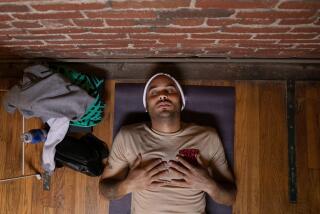Big Boys Need to Learn How to Cry : Books: The dictums of society have restricted men as much as women, say the authors of the new work, ‘Men in Therapy.’
- Share via
What Richard L. Meth and his colleagues say is not always popular.
Amid the women’s movement, the children’s movement and the concern for the elderly, they are making a plea for the average guy: the man left behind and bewildered by society’s rapid changes, and who is often blamed for a complex and restrictive system in place eons before he was born.
They say adages such as “big boys don’t cry” and “take it like a man” restrict men from having a happy and fulfilling emotional life. They say socialization has restricted men as much as it has women.
Meth knows not everyone agrees with him. The popular press, in general, makes fun of the Alan Alda-sensitive male discussions pervasive in so many therapeutic environments.
Big boys, after all, don’t cry.
But, Meth says, one of the lesser-examined impacts of the women’s movement is its effect on men. Now, Meth and others say, big boys had better learn to cry--and laugh and talk about their feelings.
“As long as men perceived themselves as being in a position of power, their goal in life was to be successful,” says Meth, executive program director of the Center for Marital and Family Therapy at the University of Connecticut, Storrs. “Men really were not forced to look at the other aspects of their lives, and most of their lives were out of balance. Men don’t realize they are out of balance until it’s too late.”
That is, until their wives come and ask--out of the blue, or so the men think--for a divorce. Or until their doctors tell them they have to restrict their diets and take up exercise or risk an early grave.
Looking at the women’s movement and its effect on men resulted in “Men in Therapy,” (Guilford Press; $30), which Meth co-wrote with colleague Robert S. Pasick, a Michigan psychologist, and others.
The book examines people like John, a 45-year-old who was in a 23-year marriage, and uses what Meth calls a universal euphemism employed by men who just don’t want to open up and talk.
“I’m a private person,” says John--a euphemism, Meth says, for: “I am not going to be vulnerable.”
So when a man is in an emotionally critical time, he often can only say he is angry--an aggressive, rather than vulnerable, emotion, Meth says. And even if parents make a concerted effort to teach their sons that it’s all right to cry, society often steps in. Meth, who has a son in preschool, says his boy recently told him something that had happened at school and said proudly, “And I didn’t cry, Dad.”
“If his peers say, ‘Don’t be such a wimp,’ he doesn’t cry,” Meth says. “It doesn’t matter what Dad says.”
Meth says men too often are dragged into therapy by their unhappy female partners. They rarely go on their own.
The authors examine men’s relationships with their wives, mothers, children, fathers and the workplace; how those relationships came to be, and how they could be approached differently to keep step with societal shifts.
To people who argue that men are to blame for their own imbalances, Meth says most men are only reacting to their socialization.
“One of the things I do all the time (with clients) is get men to think about why they do what they do,” he says. “I have asked some men for reasons, and they say, ‘Because that’s what guys do.’
“We try to challenge people to think about these kinds of stereotypical behaviors that people take on. When you think about it, if you ask a man why they do what they do, this is something they acquired along the way.”
More to Read
Sign up for our Book Club newsletter
Get the latest news, events and more from the Los Angeles Times Book Club, and help us get L.A. reading and talking.
You may occasionally receive promotional content from the Los Angeles Times.







